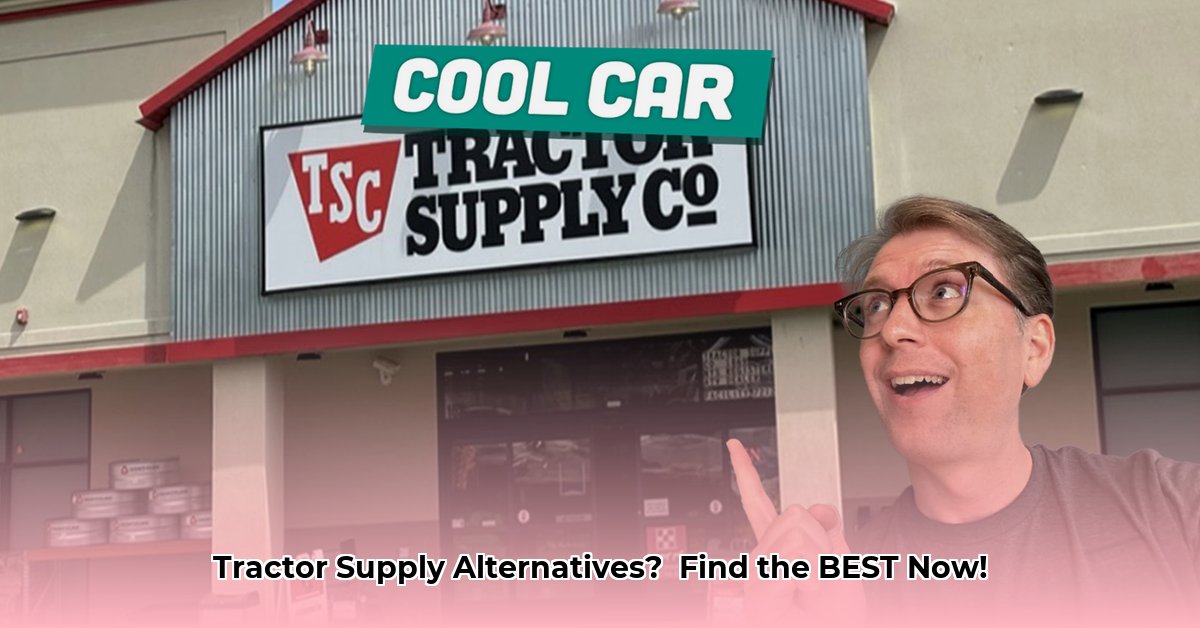
Places Like Tractor Supply: Navigating the Rural Retail Landscape in 2024
Finding viable alternatives to Tractor Supply requires a nuanced understanding of the rural retail market. While Tractor Supply dominates, a diverse competitive landscape offers compelling options for farmers, ranchers, and rural consumers. This analysis examines key competitors, their strengths and weaknesses, and emerging trends shaping the future of rural retail. For more on agricultural equipment brands, see this helpful resource.
Tractor Supply's Competitive Advantage: A Deep Dive
Tractor Supply's success stems from a potent combination of factors: a broad product selection catering to rural needs, conveniently located stores, and a strong brand reputation built on understanding the unique demands of its customer base. However, this dominance doesn't guarantee continued market leadership; competitors are actively challenging Tractor Supply's position.
The Competitive Landscape: A Multi-faceted Approach
The competitive landscape includes three primary competitor types:
Regional Chains (e.g., Rural King, Fleet Farm): These regional players possess deep local market knowledge, often offering competitive pricing and product assortments tailored to specific regional needs. However, their limited geographic reach restricts market penetration. Their strength lies in personalized service and community engagement.
National Retailers (e.g., Home Depot, Walmart): Major national retailers leverage extensive brand recognition and broad product availability. However, their focus isn't solely on rural consumers, potentially resulting in less specialized product selections and higher prices compared to regional competitors.
Online Retailers (e.g., Amazon): E-commerce giants offer unparalleled convenience and vast product selections. Yet, challenges include shipping costs, potential delivery delays to rural areas, and the absence of the in-person shopping experience valued by many rural consumers. This presents both a significant threat and opportunity for adaptation.
Competitive Analysis: Strengths and Weaknesses
The following table summarizes the advantages and disadvantages of each competitor type:
| Competitor Type | Advantages | Disadvantages |
|---|---|---|
| Regional Chains | Strong local knowledge, competitive pricing, personalized service, community ties | Limited geographic reach, potentially smaller product selection |
| National Retailers | Wide product selection, convenient locations, strong brand recognition | Less focus on rural needs, potentially higher pricing, impersonal customer service |
| Online Retailers | Convenience, vast selection, potential price competitiveness | High shipping costs, delivery delays to rural areas, lack of personalized service |
Key Success Factors for Rural Retailers
Maintaining a competitive edge requires adaptability and a deep understanding of evolving market dynamics. For Tractor Supply and its competitors, key strategies include:
- Enhanced Online Presence: Expanding online capabilities to offer both convenience and specialized products tailored to rural customers.
- Product Differentiation: Developing unique brands and product lines that cater to the specific needs of rural communities.
- Data-Driven Decision Making: Utilizing data analytics to understand consumer preferences and optimize inventory and marketing efforts.
- Strengthening Customer Relationships: Building strong customer relationships through personalized service and targeted outreach.
- Effective Logistics: Improving delivery options and addressing the challenges of efficient last-mile delivery in rural areas.
The Future of Rural Retail: Navigating Uncertainty
The rural retail landscape is dynamic. Technological advancements, economic shifts, and changing consumer expectations create ongoing challenges and opportunities. Success will hinge on agility, innovation, and a keen understanding of rural consumer needs. The ongoing competition ultimately benefits consumers by offering increased choice and driving innovation to improve value and convenience.
How to Improve Rural Retail Store Online Presence to Compete with Amazon
Rural retailers face significant challenges competing with the scale and reach of Amazon. Building a strong online presence is no longer optional; it's crucial for survival and growth.
The Rural eCommerce Landscape: Unique Hurdles
Rural areas often lack the robust digital infrastructure found in urban centers, and consumer behaviors vary. This necessitates adapting to a unique customer base. How can rural stores enhance their online presence and compete?
Omnichannel Strategies: Learning from Walmart
Walmart's successful rural strategy demonstrates the power of omnichannel integration. Their physical stores serve as strategic fulfillment centers, offering in-store pickup and bridging the gap between online and offline shopping. The model adapts to rural limitations of pure e-commerce.
Key Steps to Enhance Online Presence
Rural retailers must implement a comprehensive strategy that includes:
Website Optimization: Invest in a user-friendly, mobile-responsive website optimized for search engines (SEO), showcasing high-quality product images and detailed descriptions. Ensure seamless checkout.
Digital Marketing: Employ targeted advertising campaigns on social media and search engines, build an email marketing list, and cultivate a local community presence.
Enhanced Logistics: Partner with local delivery services, offer in-store pickup, and explore drone delivery.
CRM Implementation: Use a CRM system for understanding customer preferences and tailoring the experience. Collect customer feedback.
Technology Adoption: Invest in POS systems that integrate sales data and use data analytics for improving strategies. Ensure consistent staff training.
Risk Assessment and Mitigation
Expanding online requires addressing risks such as limited internet access and technical expertise. However, the benefits – increased market reach, improved customer engagement, and enhanced operational efficiency – largely outweigh these challenges.
Leveraging Local Expertise: The Competitive Advantage
Rural retailers possess a critical edge: a deep understanding of their local communities and the specific needs of their customers. By leveraging this local knowledge, emphasizing personalized service, and offering curated product lines, they can establish a strong competitive advantage against larger, less personalized players. This connection fosters community and loyalty in a digital world.